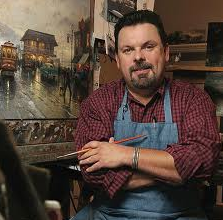 World famous painter Thomas Kinkade, knew how to capture an admiring fan base through his use of saturated pastel colors and idyllic, peaceful gardens, stone cottages, and lighthouses. After all, about 1 in every American home showcases a copy of his artwork.
World famous painter Thomas Kinkade, knew how to capture an admiring fan base through his use of saturated pastel colors and idyllic, peaceful gardens, stone cottages, and lighthouses. After all, about 1 in every American home showcases a copy of his artwork.
However, this “Painter of Light” precipitated a dark, legal dispute over his multimillion-dollar estate following his death early April of this year. The legal battle is between Kinkade’s wife Nanette, of thirty years and his mistress, Amy Pinto-Walsh of 18 months. So who gets his legacy?
Ms. Walsh was with the painter in Monte Sereno, California on the night of his death when he overdosed on alcohol and Valium at the age of 54. Nanette was in the middle of divorce proceedings that had not been finalized. A joint estate plan with his wife has been set up with no mention of Amy. Yet, the paramour has produced two recent, handwritten documents claiming Kinkade had written leaving her his mansion and $10 million to establish a museum for his original artwork.
The problem is that both documents, although signed, are scrawled and barely legible. Apparently, the signatures on his marriage separation papers are much clearer. Needless to say, the wills are now heavily contested. A hearing is set for July 2 in probate court for review.
California recognizes such non-attested holographic wills so Ms. Walsh may have a shot.
However, Florida does not. Florida law requires certain formalities in order for a will to be considered valid. For example, the testator must sign the will at the end, or have a proxy sign on his behalf and in the presence of two witnesses. In addition, the testator must have the intent and be of testamentary capacity at the time the will is executed.
Florida would not recognize the holographic wills allegedly written by Kinkade because it does not adhere to the required formalities. Wills that are recognized can also be challenged on several grounds. In Florida’s probate courts, the validity of a will, under this Kinkade scenerio, could be contested on grounds of forgery, lack of sound mind, duress or undue influence.
Don’t make the same mistake like Thomas Kinkade by painting an ugly, legal mess for your heirs and beneficiaries.
Instead, draft your Florida Last Will and Testament with the artistic precision of a careful painter’s brush strokes by consulting your South Florida estate planning attorney today.
If you have family, friends or even a charitable intent, the absence of an estate plan is inexcusable. For more information on successful Florida estate planning and probate techniques, please contact the South Florida law firm of Wild Felice & Partners, P.A. at 954-944-2855 or via email at info@wfplaw.com to schedule your free consultation.
It’s a Wild world. Are you protected?
